On Thursday, August 27, in partnership with the Palo Alto Library and the City of Palo Alto, the Bill Lane Center co-hosted a Palo Alto Reads event with Richard Rothstein about his book, "The Color of Law: A Forgotten History of How Our Government Segregated America." Rothstein was joined in conversation by Ralph Richard Banks, a law professor and faculty director of Stanford's Center for Racial Justice. Over 400 attendees participated in the virtual event via Zoom, but for those who missed the important talk on residential segregation, and the wealth gap it created between Black and white families, a recording is now available here.
Rothstein's thesis -- that residential segregation was created by government policy in the mid-twentieth century that explicitly tried to separate Blacks from whites -- asks readers to confront a long and shameful history of racist practices in the United States. Despite the successes of the Civil Rights movement of the 1960s, these practices are insidious and ongoing. Moreover, Rothstein argues that unconstitutional U.S. policies resulted in the proliferation of all-white suburbs everywhere in the country, ensuring a racial wealth gap that Rothstein described as a threat to our democracy. While most white families have wealth from the equity of their homes, Rothstein elaborated during his remarks, Blacks were prohibited, by explicit federal policy, from participating in this wealth-generating exercise.
Current policies to redress segregation do far too little: "The limited programs we have to subsidize housing for low-income families -- disproportionately minority families -- are being built in low-income neighborhoods, not in high-opportunity neighborhoods," Rothstein said. Moving forward, Rothstein suggested eliminating zone ordinances that stipulate only single-family homes can be built in certain areas. He also spoke in support of modifying the Housing Choice Voucher program known as Section 8 so that underserved families can move into high-opportunity communities.
Law Professor Ralph Richard Banks, moderator of the program, challenged many of Rothstein's assertions, arguing that zoning reform wouldn't go far enough to redress policies that were so pernicious. After all, Banks noted, the "forgetting" in the book's subtitle - "A Forgotten History of How Our Government Segregated America" - was actually a motivated forgetting, not an accidental one. And the motivation to forget is fueled by a widespread concern among affluent Americans that changing zoning requirements will reduce the property value of their homes. "Communities are competing with each other to have the highest property values and the most exclusive community," Banks remarked at one point. "What if we took all the control for zoning and housing matters away from local decision-makers, and have those decisions be made at a regional or state level instead?"
Banks also took issue with Rothstein's optimism about moving low-income families into high-income neighborhoods: "Why integrate Black and white neighborhoods, forcing blacks and whites to live next to one another? Why not revitalize and invest in black neighborhoods?" Banks asked at one point.
At the end of the day, Rothstein acknowledged, American communities must do more than just reform zoning policies. "Residential segregation won't end without a new civil rights movement," he stated. "We need a new civil rights movement that's going to, in the words of John Lewis, 'make good trouble.'"
As for how to launch this movement, and the specifics of achieving its goals, Rothstein was less clear. But he did express hope that it's possible, and was pushed by his interlocutor to consider solutions that go far beyond the scope of his book.



